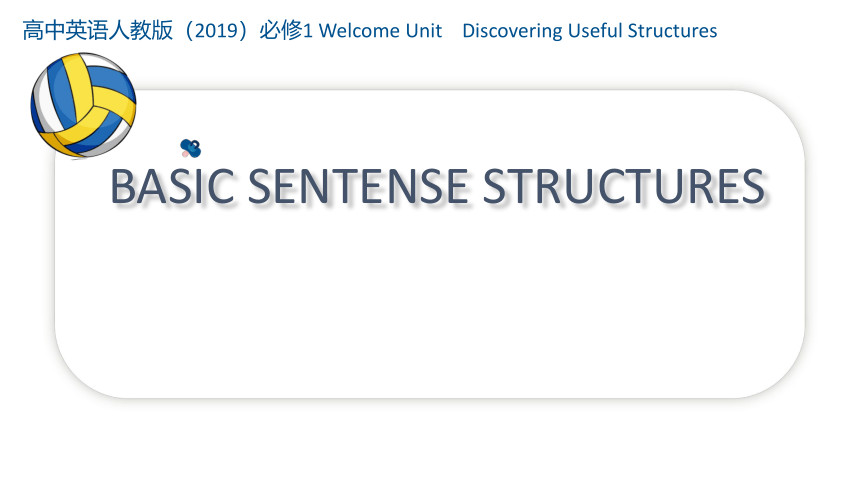(
课件网) BASIC SENTENSE STRUCTURES 高中英语人教版(2019)必修1 Welcome Unit Discovering Useful Structures She is dancing. 丰富成分之后 She is dancing with her professional partners in the stage which has been decorated beautifully now. 感受一下 原句:She is dancing. She is dancing now. She is dancing with her partners now. She is dancing with her professional partners now. She is dancing with her professional partners in the stage now. She is dancing with her professional partners in the stage which has been decorated beautifully now. 补充:增加定状 (加时间状语) (加伴随状语) (加定语) (加地点状语) (加定语从句) Warming up 热身环节 Members of Sentences 句子成分 目 录 CONTENTS 2 1 3 Homework 作业 Warming up 热身环节 1 Warming up 热身环节 Jackson has his families. Members of sentences Members of Sentences 句子成分 2 Members of sentences 句子成分 I'm the head of the family, so people call me “the subject”. 主语 是句子要说明的人或物,说明谓语所表示的动作或状态的执行者。是一个句子所叙述的主体,一般位于句首。 主语 The sun rises in the east. I am the head of the family. Seeing is believing. To say is one thing, and to do is another. Two in distress makes the sorrow less. What he said impressed me a lot. 名词 代词 动名词 不定式 数词 (一)主语:放句首。 从句 Members of sentences 句子成分 Without me, without home. I'm the most important one. 谓语动词 说明主语所做的动作或具有的特征和状态。动词在句中作谓语,一般放在主语之后。 谓语动词 (二)谓语:主语之后。由动词担任 行为动词(实义动词) 及物动词transitive verb 不及物动词intransitive verb 情态动词 can (could), may (might), must, need, ought to, dare (dared), shall (should), will (would)+动词原形 助动词 be, have/has, do/does, shall, did, will,should, would等助动词协助主要动词构成或者构成疑问句和否定句,构成否定句时与否定not连用。 I have a best friend. Her name is Jenny. We look after each other. But she doesn’t like talking too much. She can keep quiet for a whole day. 单个实义动词 系动词 动词短语 助动词+动词原型 情态动词+动词原型 ——— ——— ——— ——— ——— 找 出 所 有 谓 语 并 分 析 谓 语 类 型 Object 宾语 Let's call him ”object”. What's his name I'm the object. I always follow my mom. 宾语 宾语(Object)表示动作的对象或承受者,一般位于及物动词和介词后面。 宾语 I love you. Look at me. 宾语分为直接宾语和间接宾语. He gave me some books. ↓ 间接 宾语 ↓ 直接 宾语 (三)宾语:放在动词、介词之后 双 宾 语 Wang Ling lent me a novel to read in the bus. (双宾语) me 间接宾语 表示受影响的人或事。 a novel 直接宾语 表示动作的直接承受者或结果。 补充跟双宾的动词 (需借助to的)bring, give, lend, hand, offer, pass, pay, promise, return, send, show, teach, tell, write, ask,等。 He sent the novel to William yesterday.=He sent William the novel yesterday. ↓ 间接宾语 ↓ 直接宾语 ↓ 直接宾语 ↓ 间接宾语 补充跟双宾的动词 (需借助for 的) buy, call, cook, choose, draw, find, get, make, order, sing, save, spare,等。 She bought her mother a gift.=She boug ... ...

